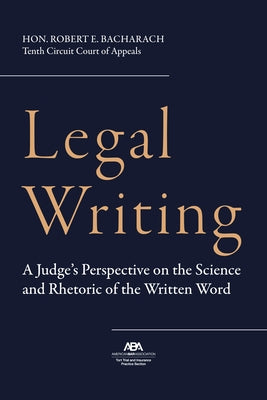Description
"Effective legal writing calls not only for artistry but also for scientific understanding." In this synthesis of his experience on the bench and his own research into the science and art of written communications, Robert E. Bacharach, a federal court judge, shares his insights on ways language can determine different responses -- and how to use this knowledge to craft a powerful and persuasive message.
Judge Bacharach follows a logical progression in crafting effective legal writing, beginning with the importance of an introduction that provides a context for the argument. At this stage, it is important to consider clarity, context, identification of the underlying legal issues, the structure of your argument, and stating the rationale for the optimum outcome.
Subsequent chapters look at specific aspects of effective legal writing, including:
- Organization - the guiding principles of parallelism, logical sequence, and developing the point before responding to the adversarial argument
- Headings - creating a familiar context to make it easier for readers to follow your argument
- Fact sections - the importance of a clearly written summary of legal facts that is readily understandable Sentences and paragraphs - in-depth commentary on structural issues such as varying the length of the sentence structure to key rhetorical devices, all to make the reader follow the flow of the argument
- Diction - how to choose the right word (and why)
- Grammar - the most essential rules to follow for effective legal writing
- Conclusions - how to end strong with a concise reminder of the core points
- Quoting - when--and when not--to use it
- Typography and page layout
Throughout the book, Judge Bacharach illustrates his points with real-world examples from lawyers and judges. As Lisa Blatt of Williams & Connolly states, this is an "easily readable and comprehensive catalogue of do's and don'ts that provides the essential foundations for clear, persuasive legal writing . . . From diction to grammar, and alliterations to aphorisms, this book is mandatory reading for law students and lawyers alike."
Author: Robert E. Bacharach
Publisher: American Bar Association
Published: 10/15/2022
Pages: 184
Binding Type: Paperback
Weight: 0.60lbs
Size: 8.90h x 6.00w x 0.40d
ISBN13: 9781641056595
ISBN10: 1641056592
BISAC Categories:
- Law | Courts | General
- Law | Trial Practice
- Law | Legal Writing
About the Author
Judge Bacharach was appointed in March 2013 as a United States Circuit Judge for the Tenth Circuit Court of Appeals.He graduated with High Honors from the University of Oklahoma with a B.A. in History and the Tom Lottinville Award for the Best Essay submitted in the History Department. He obtained his Juris Doctorate from Washington University School of Law in St. Louis in 1985, where he graduated order of the coif and was awarded the Breckenridge Scholarship for the second highest grade average in his senior year of law school. In law school at Washington University, he also served as the Developments Editor of the Washington University Law Quarterly (now named the Washington University Law Review) and was awarded the Mary Collier Hitchcock Prize for writing for the best Note (student article) in the law review.Upon graduation from law school, Judge Bacharach clerked from 1985 to 1987 for Judge William J. Holloway, Jr., who was then the Chief Judge of the Tenth Circuit Court of Appeals. After completing this clerkship, Judge Bacharach practiced civil litigation at Crowe & Dunlevy in Oklahoma City, Oklahoma from 1987 to 1999. He then served as a U.S. Magistrate Judge in the Western District of Oklahoma until 2013, when he was appointed to the Tenth Circuit Court of Appeals. Judge Bacharach authored the recently published book on legal writing, Legal Writing: A Judge's Perspective on the Science and Rhetoric of the Written Word, published by ABA Press. He has also authored Section 1983 and the Availability of a Federal Forum: A Reappraisal of the Police Brutality Cases, 16 Memphis State University Law Review 353 (1986); Section 1983 and an Administrative Exhaustion Requirement, 40 Oklahoma Law Review 407 (1987); AMotions in Limine in Oklahoma State and Federal Courts, 24 Oklahoma City University Law Review 113 (1999); Dirks v. SECs Footnote Fourteen: Horizontal and Vertical Reach,62 Washington University Law Quarterly 477 (1984); and Post-Trial Juror Interviews by the Press: The Fifth Circuit's Approach, 62 Washington University Law Quarterly 783 (1985). In addition, he and Professor Lyn Entzeroth (now Dean of Tulsa University School of Law) coauthored Judicial Advocacy in Pro Se Litigation: A Return to Neutrality, 42 Indiana Law Review 19 (2009).Judge Bacharach was also honored with the national Federal Bar Association's Earl W. Kintner Award.

